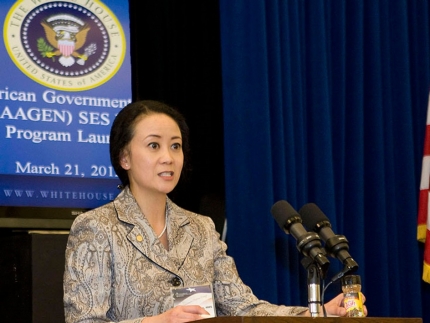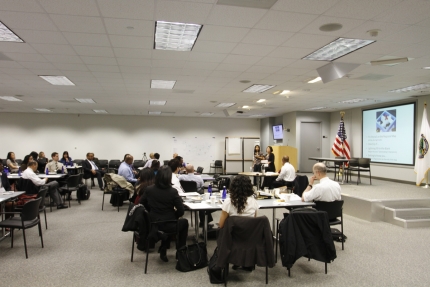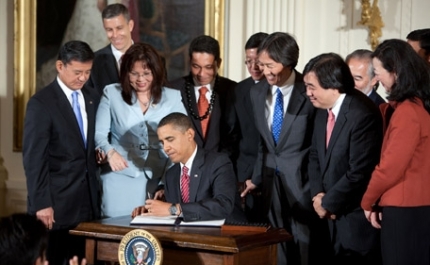Initiative on Asian Americans and Pacific Islanders Blog
Learn About the Health Insurance Marketplace in Chinese (Mandarin)
Posted by on December 20, 2013 at 6:38 PM ESTI’m pleased to announce that we will be continuing our Google+ Hangout Series on the Health Insurance Marketplace in Chinese. Almost one in seven Chinese Americans lacks health insurance. Chinese Americans are also among the highest limited English proficient populations in the nation. Almost half of all Chinese Americans (46 percent) report speaking English less than very well. So, access to information on health care in Chinese is critical to increasing health insurance coverage and access to health care among Chinese Americans.
During the Hangout, there will be a live question and answer period with Mandarin-speaking representatives from the U.S. Department of Health and Human Services. They will respond to your questions and provide information on how to obtain health care coverage through the new Marketplace.
The Chinese language Hangout will take place on Thursday, January 23, 2014 from 3:00 - 4:00 PM (EST). We hope you will join us by watching live at a local viewing party or online by joining our Google+ Hangout. You may also submit your questions in advance by emailing whitehouseaapi@ed.gov or Tweeting them to @WhiteHouseAAPI. More information about the in-language Hangouts can be found on the WHIAAPI website, and more information about the Affordable Care Act can be found at HealthCare.gov.
We hope you will join the conversation – in Mandarin! Our goal is to bring greater awareness of health care to the AAPI population, so that all people achieve their full potential for health.
Ramey Ko is a member of the President’s Advisory Commission on Asian Americans and Pacific Islanders.
你好,我很高兴宣布,美国白宫倡议为亚裔美国人和太平洋岛民将会继续以中文透过Google+ Hangout Series 讲解健康保险。大约7分之1的华人欠缺健康保险。在美国,许多华人的英语能力是有限的。根据我们的数据显示,百分之46的华人面对沟通上的语言障碍。因此,中文的医疗保险资料的重要性是能够提高医疗保险覆盖面并提供医疗保健给华人。
在Hangout期间,参加者将会以普通话与美国人类服务部网页的代表人参与现场问答时间。他们会回答您的问题,并提供如何在新的健康保险市场申请医疗保险。
我们的华语Google Hangout将在星期四,2014年1月23日,下午3:00 - 下午4:00 (美国东岸时间) 举行。我们希望您能通过看直播在当地或网络加入我们的Google+ Hangout。参与的朋友可于Google+ Q&A问答环节以Twitter @WhiteHouseAAPI 或提前以电邮whitehouseaapi@ed.gov提交相关问题。更多关于语言Hangouts可以在WHIAAPI 网站上找到, 而更多有关医疗法的资料可以在HealthCare.gov找到。
我们希望你能加入这次重要的通话!我们的目标是将医疗保健介绍到亚太裔群体,让全体人民活得健健康康。
你好,我很高興宣布,美國白宮倡議為亞裔美國人和太平洋島民將會繼續以中文透過Google+ Hangout Series 講解健康保險。大約7分之1的華人欠缺健康保險。在美國,許多華人的英語能力是有限的。根據我們的數據顯示,百分之46的華人面對溝通上的語言障礙。因此,中文的醫療保險資料的重要性是能夠提高醫療保險覆蓋面並提供醫療保健給華人。
在Hangout期間,參加者將會以普通話與美國人類服務部網頁的代表人參與現場問答時間。他們會回答您的問題,並提供如何在新的健康保險市場申請醫療保險。
我們的華語Google Hangout將在星期四,2014年1月23日,下午3:00 - 下午4:00 (美國東岸時間) 舉行。我們希望您能通過看直播在當地或網絡加入我們的Google+ Hangout。參與的朋友可於Google+ Q&A問答環節以Twitter @WhiteHouseAAPI 或提前以電郵whitehouseaapi@ed.gov提交相關問題。更多關於語言Hangouts可以在WHIAAPI 網站上找到, 而更多有關醫療法的資料可以在HealthCare.gov找到。
我們希望你能加入這次重要的通話!我們的目標是將醫療保健介紹到亞太裔群體,讓全體人民活得健健康康。
Learn more about Health CareImproving Data Collection on Native Hawaiian and Pacific Islander Health
Posted by on December 18, 2013 at 10:49 AM ESTOver the last four years at the White House Initiative on Asian Americans and Pacific Islanders (WHIAAPI), we have been working with federal agencies across the board to improve data collection, analysis, and dissemination of findings and reports on Asian Americans and Native Hawaiians and Pacific Islanders (NHPIs). We have been particularly focused on NHPIs, who, according to the 2010 U.S. Census, comprise just 0.4 percent of the total U.S. population, making it difficult to include them in sufficient numbers in most national population-based health surveys. The lack of reliable health data for this population has made it difficult to assess their health status and health care utilization. However, the available data for this population indicates that Native Hawaiians and Pacific Islanders experience significant health disparities when compared to other groups, such as lower utilization of health care services and higher rates of chronic diseases, such as diabetes and obesity.
That’s why we welcome the announcement made today that the U.S. Department of Health and Human Services (HHS) will launch the first-ever, large-scale national health survey to collect detailed health information on NHPI households – the Native Hawaiian/Pacific Islander National Health Interview Survey. This information will be collected through HHS’ National Health Interview Survey, the nation’s largest in-person, household health survey. Never before has there been a study of this scale to assess the health needs of NHPIs, and this type of survey has long been called for by the NHPI community. This important effort will help improve our understanding of the health concerns – from access to health care to health insurance coverage to rates of chronic diseases like diabetes or heart disease – faced by this community and to identify areas of opportunity for federal government to better address these concerns.
WHIAAPI encourages advocates and organizations across the country to join us in spreading the word about this landmark survey. We hope you can continue the conversation with us on Twitter using #NHPI.
Our hope is that the results of this study will provide researchers, policymakers, and community leaders with the data they need to understand and address disparities in health and health care, and provide lessons for data collection and analysis focused on small populations.
The Native Hawaiian/Pacific Islander National Health Interview Survey will begin early next year, and the results will become available summer 2015.
Kiran Ahuja is the Executive Director of the White House Initiative on Asian Americans and Pacific Islanders.
Learn more about Health CareBuilding a Federal Workforce that Reflects a Changing America
Posted by on December 16, 2013 at 10:21 AM ESTThe face of America is changing. According to population estimates, 2011 marked the first time more children were born from minority backgrounds than whites. And the U.S. Census projects that America will become a majority-minority nation in 2043. This is a huge shift in the face of our country, and especially for Asian Americans and Pacific Islanders (AAPIs).
AAPIs have been the fastest growing racial group over the past 10 years, growing almost 50%, more than four times as fast as the total U.S. population. AAPIs are also now projected to more than double, from 15.9 million in 2012 to 34.4 million in 2060.
As America becomes more diverse, the federal workforce and its leadership should reflect the public we serve. By 2020, almost one out of every five (19.5%) Americans will be of Asian American and Pacific Islander (AAPI) descent. Yet AAPIs currently account for only 5.6% of the total federal workforce and only 4.4% of the Senior Executive Service (SES), the highest managerial level in the federal government.
The White House Initiative on Asian Americans and Pacific Islanders (WHIAAPI) has been collaborating with federal agencies and community organizations to increase AAPI representation in the federal government at all levels, strengthening the pipeline for AAPIs to enter and advance up the ranks. One example is how WHIAAPI, the Office of Personnel Management, the Equal Employment Opportunity Commission, and the Asian American Government Executives Network (AAGEN) are working together to provide opportunities for AAPIs and others to gain the skills to vie for SES positions through AAGEN’s SES Development Program. I am a proud graduate of the program, which prepares GS-15 (or equivalent) federal employees to apply for SES positions through in-depth training and mentoring. Because of my participation in this program, I was able to rise to the SES ranks.
AAGEN’s SES Development Program helped me fine-tune my “big picture” executive level thinking through comprehensive coursework and coaching. The program included executive development courses led by accomplished leaders in the public and private sectors, coaching in mock interviews, individual mentoring, and career counseling. I came out of the program with a prepared SES application, stronger interviewing and public speaking skills, and new networks to advance my career. Because of the AAGEN program, I had the knowledge, support, and confidence to apply for SES positions and successfully secured the position I am in today in the federal government.
I strongly encourage GS-15 (or equivalent) federal employees with sights on the SES level to apply for AAGEN’s SES Development Program. Applications for the next cycle will be accepted through December 31, 2013. The next class will commence in April 2014 and the program will continue to March 2015. Training sessions will be held each quarter in the Washington, DC metro area. To apply for the program, visit www.aagen.org.
Through similar programs, we can build a stronger, more diverse federal workforce. Together, we can help make AAPIs an integral part of our federal government.
Marla Hendriksson is the Director of Communications at the Substance Abuse and Mental Health Services Administration.
Regional Interagency Working Group: Community Engagement Partners at the Grassroots Level
Posted by on December 13, 2013 at 10:00 AM ESTWith jackets off, sleeves rolled up, and ready for action, members from the White House Initiative on Asian Americans and Pacific Islanders (WHIAAPI) Regional Interagency Working Group (RIWG) gathered in Washington, DC last week to plan future engagement efforts with the AAPI community across the country. Members of the RIWG include over 100 Regional Administrators, District Directors, Assistant District Directors, and staff from over 20 federal agencies and sub-agencies. More importantly, RIWG members are members of your community. We are your neighbors and we understand the issues that you face every day.
The RIWG was created to better coordinate community engagement efforts across federal regional offices and to share information and resources between agencies and with the AAPI community. In just a few short months, the RIWG has already organized community events in New York, Chicago, Boston, San Francisco, and Los Angeles. At these events, RIWG members heard directly from the AAPI community about their challenges, tried to demystify the federal government and its programs and services, and created new partnerships with community leaders.
The meeting in Washington, DC connected RIWG members with others in our region and from across the country. We had a chance to strategize within our regions on community roundtable plans for 2014. We learned strategies related to capacity building that will help grow and sustain our community partners. And we learned about the demographic landscape of the AAPI community in our regions.
The RIWG helps address the AAPI community’s needs in their communities. I left the meeting with great excitement and hope that the RIWG can help bolster direct government engagement with the AAPI community and serve as a model to effectively connect with all communities.
Paul Chang is Assistant District Director for the Wage and Hour Division at the U.S. Department of Labor. He is also a member of the White House Initiative on AAPIs Regional Interagency Working Group.
WHIAAPI Webinar on a New Federal Immigrant Integration Initiative
Posted by on December 10, 2013 at 3:57 PM ESTThe White House Initiative on Asian Americans and Pacific Islanders (WHIAAPI) is pleased to invite you to participate in:
A Webinar on a new Federal Immigrant Integration Initiative
December 13, 2013, at 3:00-3:45 pm EST
This webinar will describe a new federal initiative on immigrant integration provided by the Office of Vocational and Adult Education (OVAE), US Department of Education. Join us to learn how the U.S. Department of Education is partnering to create networks for effective immigrant integration. Also, hear about locally-driven efforts to create more welcoming, immigrant-friendly environments that maximize opportunities for economic growth and cultural vitality.
Speaker:
Debra Suarez, English Language Learning (ELL) Education Specialist, Office of Vocational and Adult Education (OVAE), U.S. Department of Education
If you would like to participate, please find the log-in information below:
Web Chat / Webinar Information:
1. Click Here
2. If requested, enter your name and email address.
3. If a meeting number is required, enter the meeting number: 740 007 809.
4. If a password is required, enter the meeting password: whitehouseaapi
5. Click "Join".
6. Follow the instructions that appear on your screen.Note: This call is off the record and not for press purposes.
RSVP:
Email whitehouseaapi@ed.gov with the subject line: “Immigrant Integration Webinar” and please provide your name and organization. You must RSVP in order to receive the presentation materials that will be reviewed during the call. Please feel free to share this invitation with your networks. We hope you will join us this Friday!Tuyet Duong is a Senior Advisor at the White House Initiative on Asian Americans and Pacific Islanders.
Learn more about ImmigrationCelebrating Four Years: Opening the Government’s Doors to the AAPI Community
Posted by on December 3, 2013 at 2:02 PM ESTThis year, we reached an important milestone.
2013 marks the four-year anniversary of the White House Initiative on Asian Americans and Pacific Islanders under President Obama. Since President Obama signed the Executive Order reestablishing the Initiative and the President’s Advisory Commission on AAPIs in October 2009, we have worked to open the doors of government to the AAPI community.
We’ve partnered with agencies throughout the government and community organizations across the country to improve the quality of life for our community. As we mark our four-year anniversary, we are proud of the work we’ve accomplished for AAPI communities, including:
- Building an Engagement Infrastructure: We’ve hosted over 200 national gatherings, roundtables, open dialogues, and workshops in 50 cities, reaching more than 30,000 people. Federal agencies learned about local demographic trends, challenges faced by immigrant and refugee communities, and ways in which community leaders, non-governmental organizations, and small businesses have joined forces to create and build thriving communities.
- Advancing Data Collection, Analysis and Dissemination: To promote best practices on data disaggregation in the AAPI community, the Initiative partnered with the Office of Budget and Management to release a working paper on agency approaches. We also hosted iCount: Equity through Representation, a symposium that addressed the hurdles educational institutions and community groups face to achieving data disaggregation and brainstormed best practices to implementing data disaggregation systems at those institutions.
- Protecting Vulnerable Populations: We created interagency working groups to address the needs and concerns of Hmong farmers and nail salon worker health and safety to break down barriers that vulnerable communities face. The Initiative also released an AAPI women’s record to bring attention to issues impacting AAPI women and girls, including domestic violence, trafficking, and health care.
- Increasing Investment and Building Capacity: We convened the National Philanthropic Briefing, bringing together more than 200 foundation leaders, federal officials, and community leaders. As a result of the briefing, the Ford Foundation, the W.K. Kellogg Foundation, and the Kresge Foundation made an initial $1 million commitment in the form of a planning grant to assist the AAPI community with creating public-private partnerships.
- Raising Health Awareness: To raise awareness of the Affordable Care Act among AAPIs with limited English proficiency, we have also held in-language Google Hangouts in Korean and Vietnamese, with a Chinese language Hangout expected in January 2014.
- Increasing Opportunities for AAPI Employees in the Federal Workforce: We helped launch the Senior Executive Service (SES) Development Program to help identify and aid applicants in preparation for the SES selection process through intensive training, education, and mentoring. The program has completed its second year, graduating 20 candidates from 12 federal departments and offices, and has opened applications for its third year.
We have been inspired by the community’s energy, expertise, and efforts. And together, we’ve accomplished a great deal. As we celebrate this milestone, take a look at our special video message to hear more about some of our key accomplishments.
This work is only the beginning. We know there is so much more to be done. We will continue to build upon our efforts by opening doors to better education, better health, better jobs, and a better America where Asian Americans and Pacific Islanders can rest assured that federal government programs and services will be accessible to them.
Read more highlights of our work over the past four years.
Kiran Ahuja is Executive Director of the White House Initiative on Asian Americans and Pacific Islanders.
Daphne Kwok is Chair of the President’s Advisory Commission on Asian Americans and Pacific Islanders.
- &lsaquo previous
- …
- 21
- 22
- 23
- 24
- 25
- 26
- 27
- 28
- 29
- …
- next &rsaquo
White House Blogs
- The White House Blog
- Middle Class Task Force
- Council of Economic Advisers
- Council on Environmental Quality
- Council on Women and Girls
- Office of Intergovernmental Affairs
- Office of Management and Budget
- Office of Public Engagement
- Office of Science & Tech Policy
- Office of Urban Affairs
- Open Government
- Faith and Neighborhood Partnerships
- Social Innovation and Civic Participation
- US Trade Representative
- Office National Drug Control Policy
categories
- AIDS Policy
- Alaska
- Blueprint for an America Built to Last
- Budget
- Civil Rights
- Defense
- Disabilities
- Economy
- Education
- Energy and Environment
- Equal Pay
- Ethics
- Faith Based
- Fiscal Responsibility
- Foreign Policy
- Grab Bag
- Health Care
- Homeland Security
- Immigration
- Innovation Fellows
- Inside the White House
- Middle Class Security
- Open Government
- Poverty
- Rural
- Seniors and Social Security
- Service
- Social Innovation
- State of the Union
- Taxes
- Technology
- Urban Policy
- Veterans
- Violence Prevention
- White House Internships
- Women
- Working Families
- Additional Issues



